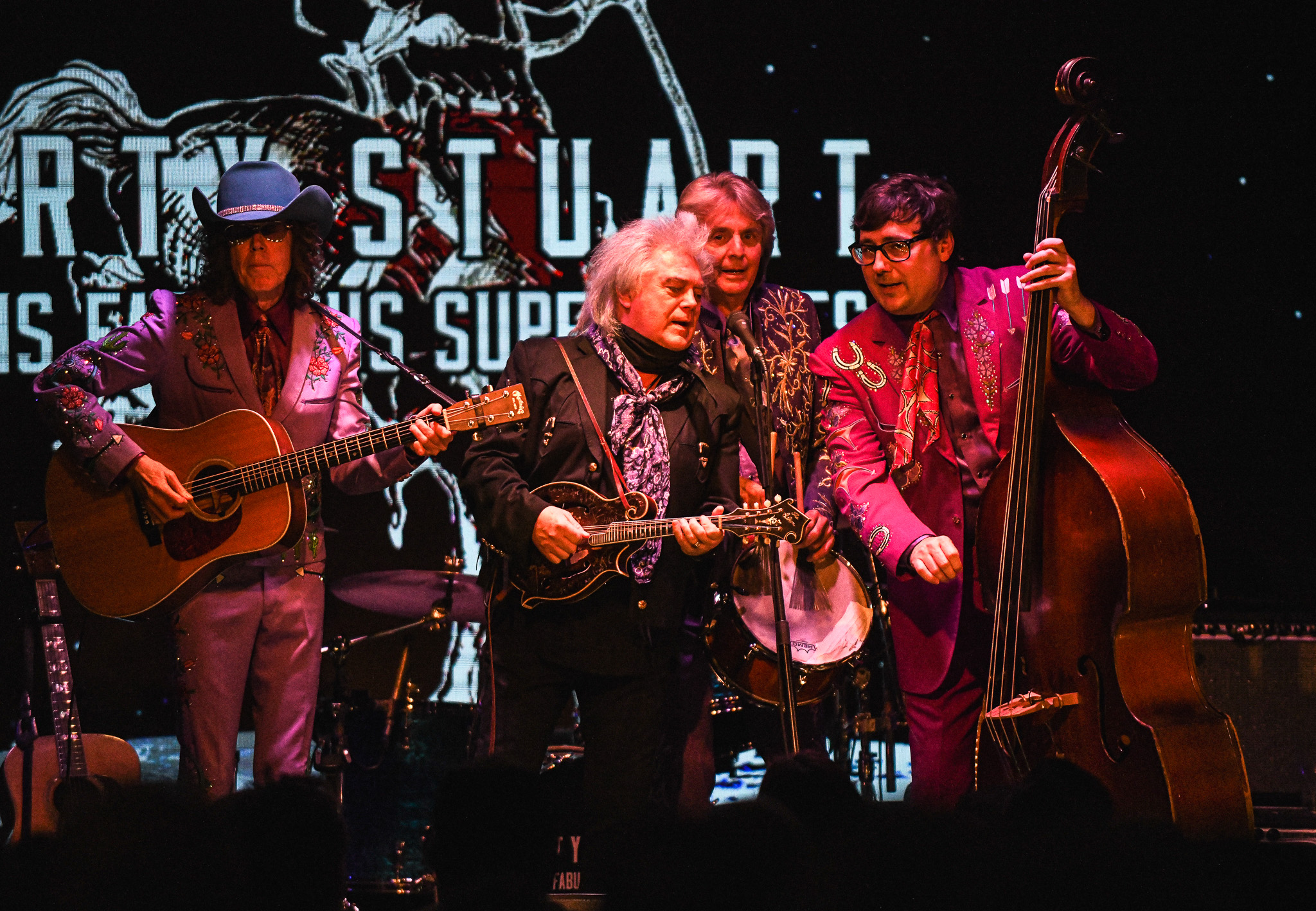
At its best, live music can be an uplifting experience. Marty Stuart & His Fabulous Superlatives put on that kind of show in their recent appearance at The Birchmere. I’d been having a rough day, been fighting a stress headache, but by the time they were done playing, it had cleared up. And then I went home and slept like a baby. So let me start by saying, “Thanks, guys!”
I think it might’ve been Richard Thompson who said that, back in the day, Buck Owens had the best rock band in country music. Today, that title would have to go to Marty Stuart and his bandmates. They are a tight unit, and they’ve been playing together for two decades. They can, of course play classic country tunes: At The Birchmere on March 28, they covered Merle Haggard’s “Mama Tried” and George Jones’s “Old, Old House.” Stuart introduced the latter by telling the audience a story about how, after an early album of his flopped, he was hanging out at Columbia Records when a tricked-out jeep rolled up. The tinted window rolled down, and there was George Jones, who said, “What the hell’s the matter with you?”
But their range goes far beyond traditional country. The set opened with an instrumental surf rock piece. Later, Marty renewed his declaration that The Birchmere is the “surf rock capitol of the world,” and they rocked out some more. Marty has always straddled the gap between country and rock, with a strong dose of rockabilly in his ouevre. Perhaps he gets that from having worked in Johnny Cash’s band, but however he came by it, it’s there in his early solo material, songs like “Tempted” and “Hillbilly Rock.”
There’s also a strong strain of The Byrds’ psychedelic country-rock here, too. In 2019, they toured with Roger McGuinn and Chris Hillman to celebrate the 50th anniversary of the trailblazing album Sweetheart of the Rodeo. Their latest album, Altitude, explores this style of music. Marty Stuart & His Fabulous Superlatives played two cuts from the record, “Tomahawk” and “Space.”
After the opening instrumental, Marty and the band played “Tear the Woodpile Down,” and Marty got the audience singing along to the chorus. Sitting close to the stage and watching the interaction amongst the band, it was clear how much these guys love what they do. They were having a good time up there, and they enjoy working together. I noticed Marty affectionally patting bassist Chris Scruggs’s cheek at one point.
Watch the official music video for “Tear the Woodpile Down” by Marty Stuart on YouTube:
As he always does, Marty gave each member of the band a chance to shine. Guitarist Kenny Vaughan, aka “Cousin Kenny,” who learned his trade from jazz virtuoso Bill Frissell and who’s been playing music as long as Marty, played “Country Music Got A Hold On Me” and “Nice Like That.” (Kenny’s chops are widely recognized; he’s won the Americana Music Association Instrumentalist of the Year and Lifetime Achievement for an Instrumentalist awards.) Bassist “Professor” Chris Scruggs, who Marty calls “country music royalty” (he’s the grandson of pioneering banjo player Earl Scruggs), played Bob Wills’s “Brain Cloudy Blues” and Bill Monroe’s “Blue Moon of Kentucky.” Drummer “Handsome” Harry Stinson contributed Woody Guthrie’s “Pretty Boy Floyd” and “The Ballad of Easy Rider,” cowritten by Bob Dylan and Roger McGuinn. (Harry is also a longtime mainstay of Nashville; that’s him singing harmonies on Steve Earle’s landmark album Guitar Town.)
When Marty was playing in Johnny Cash’s band, Cash took them to play a Lakota reservation. Marty asked him, “Why are we here?” Johnny replied, “This is the poorest county in America, and these people need our hope.” Following his mentor, Marty has developed a special relationship with the Lakota people. When he first got the Fabulous Superlatives together, work wasn’t easy to come by, and the reservation was one of the first places they performed. He and his wife, fellow country singer Connie Smith, got married there.
Marty found himself with a set of songs about the Lakota, and he was wrestling with whether to make an album out of them. He knew the songs were good, but he also knew that they had limited commercial appeal, that the album likely wouldn’t sell well. One day, a Native American man approached him with a piece of folded felt. Inside were two eagle claws. No one else said they’d seen man, and so Marty took it to be a spiritual message, and he went ahead and made the critically acclaimed album Badlands: Ballads of the Lakota. He played the title track at The Birchmere.
“Country music,” Stuart declared, “is real life.” He asked if anyone had been to prison, and one woman said that she had. “One of you is honest,” said Marty, “and the rest of you are lying.” He then asked if there were any truck drivers in the audience, and it seems there was one. This led into what he called the truck drivers’ national anthem, “Six Days On The Road.”
The main set finished up with “Time Don’t Wait,” a cut from Way Out West. When Marty came back for his encore, he referenced the recent passing of Roni Stoneman, a prominent figure in the bluegrass community in Washington, DC. He mentioned what a character she was; when she was with her fifth husband, she said to Marty, “He thinks I’m pure!”
Stuart got his start in music as a teenager playing with bluegrass legend Lester Flatt. He paid that on to a new generation in having young bluegrass mandolin player Wyatt Ellis open the show for him. Ellis’s set consisted mostly of traditional bluegrass numbers: “Hit Parade of Love,” “Ain’t It Hard,” “Duncan and Gravy,” “Unwanted Love,” “Watson’s Blues,” and “The Darkest Hour Is Just Before The Dawn.” He finished up with an original, “White’s Creek.” He’s a very talented young man, and I look forward to hearing more from him in the coming years.
Here are some photos of Marty Stuart & His Fabulous Superlatives performing at The Birchmere on March 28, 2024. All pictures copyright and courtesy of James Todd Miller.



















